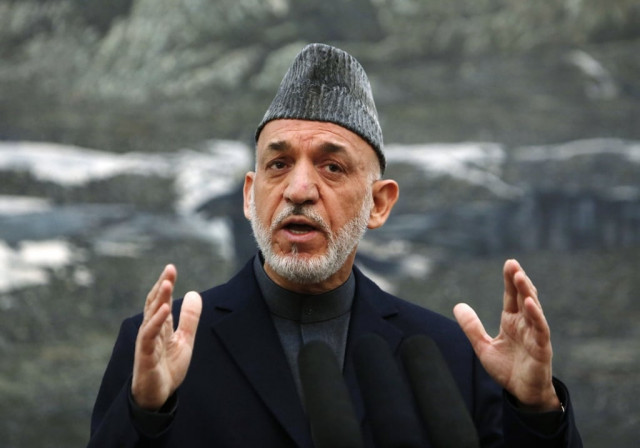Neighbourhood watch : ‘Zero option’ report sets off alarm bells in Afghanistan
Political opposition claims Karzai seeking ‘personal concessions’ from Washington.

Karzai’s top media manager was quick to term the report a “pressure tactic” employed by the US. PHOTO: REUTERS/FILE
The report stirred a heated debate in Afghanistan as opposition parties, the media and several analysts showed serious concerns over a move they believed could cause the country to slip into a state of civil war.
Karzai’s top media manager was quick to term the report a “pressure tactic” employed by the US. “The article in the New York Times is aimed at pressuring the government of Afghanistan and influencing public opinion,” wrote Afghan Presidential Spokesperson Aimal Faizi on his social media page.
The report appeared just days after Karzai abruptly suspended talks over the possible security pact in what many believe was a response to the Taliban office opening in Qatar and the US announcing it would hold direct talks with the former. However, the US dropped the idea of Taliban talks and, to pacify an angry Karzai, even agreed to what Afghan officials said about the office.
Consequently, the opposition is blaming Karzai of annoying the US. The opposition also suspects Karzai is dragging his feet in signing the security pact for the post-2014 US presence in an attempt to secure personal concessions.
Fazel Sancharaki, spokesperson for the National Coalition opposition, held Karzai personally responsible for tense relations with the US and claimed the president’s desire to secure his “own interests” was affecting negotiations. “If the zero option proves to be true, Afghanistan will be turned into a battlefield and a terrorist hub,” he said during a TV interview in Kabul this week.
In a meeting with US Senator Bob Corker, a senior republican on the Foreign Relations Committee, former foreign minister Dr Abdullah Abdullah, who leads the National Coalition, warned the Afghan president was pursuing his own interests.
In order to allay public fears over the uncertainty post-2014, Karzai on several occasions publicly stated the US wanted to maintain military bases in Afghanistan in any circumstances. However, the president was unable to come up with a clear stance over the withdrawal plan.
Most Afghan analysts seem to believe the country’s collapse into chaos is inevitable should the US call all its troops home.
Ahmad Zia Masud, leader of the National Front opposition, says civil war is the most likely scenario. “If the American forces leave, a catastrophe will occur in the country. Civil war will possibly resume and our army may vanish by disintegrating along various ethnic lines,” said Masud in a TV debate this week.
Political commentator Faizollah Jalal told Tolo TV he blamed the president for jeopardizing the country’s national interests by “seeking interests and guarantees for himself and his family’s assets in 2014 and beyond”. Jalal said Washington should consider Afghanistan a partner instead of Karzai when making a decision on the country’s future.
The suspension of talks over the security pact has also seriously worried the US, and senior American officials are anxious to restart the dialogue. According to Afghan media reports, two senior American Senators, John McCain and Lindsey Graham, visited Afghanistan this month and met senior Afghan officials including Karzai.
Talks between Afghanistan and the US started nearly nine months ago and three rounds have been held so far. However, when the Taliban office opened in Qatar last month the Afghan government announced the US had violated promises it had made and stopped negotiations.
Karzai then set conditions for signing the US-Afghan security pact, one of which requested forcing the Taliban to negotiate with the Afghan High Peace Council.
It has been five years since Karzai decided to negotiate with the Taliban. His initial efforts proved futile and the Taliban did not respond positively even once, calling Karzai a powerless US puppet.
A day after the Taliban opened their office in Doha on June 18, the group’s spokesperson for the first time indicated the Taliban would hold talks with all Afghan sides.
Now, the Karzai-US controversy has overshadowed the peace process and the closure of the Qatar office has highlighted the challenges which will be faced in the coming months. It seems Karzai has missed the opportunity he was looking for in the past five years.
Published in The Express Tribune, July 13th, 2013.












COMMENTS
Comments are moderated and generally will be posted if they are on-topic and not abusive.
For more information, please see our Comments FAQ